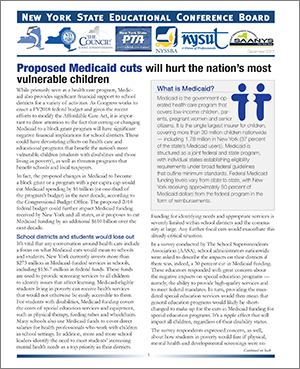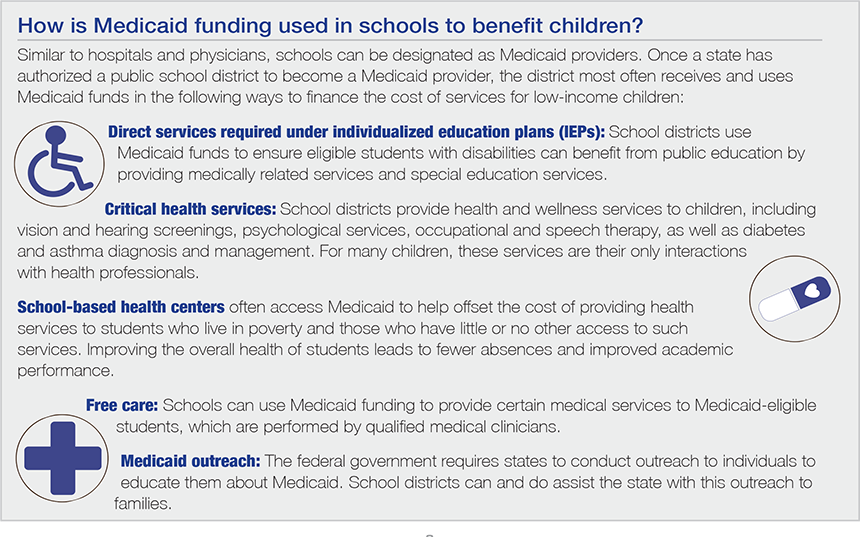Cuts will hurt the nation’s most vulnerable children, while ripple effect will negatively impact all students in the state
New York’s major statewide education organizations released information today (PDF) that raises serious concerns about the detrimental effects the proposed Medicaid cuts at the federal level would have on students throughout the state, including New York’s most vulnerable children.
 The proposed 2018 federal budget would cut $610 billion in Medicaid funding over the next decade for all states, leading to significant negative impacts on New York and its schools. Additional changes that would make Medicaid a block grant program or changes that could impose a per capita cap would further exacerbate the negative effects, leading to a $1 trillion cut in Medicaid spending (or one-third of the program’s budget) over the next 10 years.
The proposed 2018 federal budget would cut $610 billion in Medicaid funding over the next decade for all states, leading to significant negative impacts on New York and its schools. Additional changes that would make Medicaid a block grant program or changes that could impose a per capita cap would further exacerbate the negative effects, leading to a $1 trillion cut in Medicaid spending (or one-third of the program’s budget) over the next 10 years.
New York currently receives approximately 50 percent of its Medicaid dollars from the federal program in the form of reimbursements; this funding helps 1.78 million Medicaid-eligible children in the state.
“Most New Yorkers are unaware of the significant role Medicaid funding plays in our schools,” said Educational Conference Board (ECB) Chair John Yagielski. “The state currently invests more than $273 million in Medicaid-funded services in schools, which allows schools to provide critical health services to students, including students with disabilities and those living in poverty.”
The changes proposed at the federal level will likely force schools to reduce the health and wellness services offered to all children, as well having dire consequences for the entire state budget.
In a national survey conducted by the School Superintendents Association (AASA), school administrators were asked to describe the impacts on their districts if there was, indeed, a 30 percent cut in Medicaid funding. These educators responded with great concern about the negative impacts on special education programs — namely, the ability to provide high-quality services and to meet federal mandates. In turn, providing the mandated special education services would then mean that general education programs would likely be shortchanged to make up for the cuts in Medicaid funding for special education programs.
“It’s a ripple effect that will impact all children, regardless of their disability status,” Yagielski said.
The survey respondents expressed concern, as well, about how students in poverty would fare if physical, mental health and developmental screenings were no longer covered by Medicaid reimbursements. In many cases, school districts would be forced to curtail these services — again, in order to provide mandated services. Additionally, as many school districts are large employers in their communities, school administrators nationwide were also worried about having to lay off personnel whose salaries are covered by Medicaid funds.
“Cutting Medicaid or changing the program at the federal level is a no-win situation for our children,” Yagielski said. “And with the fiscal challenges facing New York as it enters the state budget development season, the stakes are even higher. “ECB members urge New York’s lawmakers, citizens and educators to follow their moral compass and fight against the proposed Medicaid cuts.”
###
The New York State Educational Conference Board includes the Conference of Big 5 School Districts; New York State Association of School Business Officials; New York State Council of School Superintendents; New York State PTA; New York State School Boards Association; New York State United Teachers; and the School Administrators Association of New York State.
